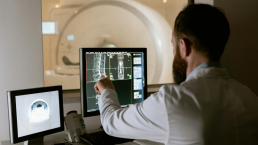
Four Ways AI Supports Healthcare
Globally, healthcare systems are facing several challenges. With populations aging and chronic disease rising, the demand for long-term care is increasing, and staff and resource limitations are widespread. Implementing AI in healthcare can help in responding to these issues. Here are four examples of how AI is saving lives.
1: Administration
Generative AI tools are trained on a large set of data to create new content, including text and images. They are optimal for simple, repetitive tasks such as transcribing notes, creating prescriptions, record management, etc.
Nurses are overworked, stressed, and understaffed. Given that the average nurse spends 25% of their time on regulatory and administrative activities, implementing generative AI could reduce their workloads.
For example, Abridge AI creates summaries of medical conversations from recorded audio during patient visits. Its benefits are twofold. First, the time saved on transcribing notes could be spent improving the quality and quantity of patient care. Second, using AI could help organise notes for easier access and readability.
Chatbots are another form of generative AI that simulate human conversation by replying to text or voice inputs from users. These can be implemented for booking appointments and screen requests, automating even more work for staff.
Applying AI in healthcare administration could ease the burden of staff shortages, help to organise data, and create time for other tasks, including face-to-face services and prioritising patient well-being.
2: Cancer patient care
Cancer diagnosis and treatment are difficult times for patients and care providers. AI is saving lives by increasing the amount of early and accurate detections, because diagnoses can be prone to human error and delay.
Deep learning is an AI method designed to detect complex patterns in data to produce accurate insights and predictions. If employed, it can perform medical scans and process data quickly and accurately.
For example, an AI-based mammogram performed 30 times faster than a human doctor and with 99% accuracy. It reviews millions of records, scans patient charts, collects diagnostic features, and then correlates them with the breast cancer subtype. A manual review of 50 charts took two clinicians from 50 to 70 hours, while the AI reviewed 500 in a few hours. Implementing AI could save doctors hundreds of hours in cancer screening alone.
Again, AI in healthcare could reduce workloads and help organise data more effectively. For cancer treatment, this would reduce human error and enable more screenings without losing accuracy.
3: AI research assistant
The volume of health data is growing rapidly, and 80% of it is unstructured, meaning it is not contained in any database and is, therefore, inaccessible for most researchers.
An article in Sustainability looks at how, while researching, generative AI such as ChatGPT can be applied to perform repetitive and time-consuming tasks. This includes data collection, processing, entry, and formatting. This could help to ensure that data remains organised and accessible. Deep learning models can also be applied to detect and analyse any patterns in the data more accurately and at a quicker rate than humans.
Afterwards, the chatbot can serve as an editor that is available always and everywhere. Writers can ask it to help improve their readability and even to translate their work into different languages.
As highlighted in the article, applying AI to healthcare research allows “researchers to focus on more complex and creative tasks”. This could ultimately improve the general quality of research and make it more consistent. Paired with open access, which is a key value for MDPI, using AI could quicken the researching process, improve the quality of writing, and ensure that published work is accessible globally.
4: Artificially intelligent robots
Aging populations represent a key challenge for healthcare systems. In response, scientists in Japan are already using robots to aid the elderly. RoBear is a nursing-care robot “designed to lift patients out of beds and into wheelchairs, as well as helping those who need assistance to stand up”.
Similarly, in the US, ElliQ is an AI device that elderly people can speak to as a friend that gently gives health suggestions. It picks up little details, such as favourite songs or food, and recalls them in later conversations, notifies you about bad weather, and ensures you have enough food in.
A robot is a programmable machine that can carry out a series of tasks. Artificially intelligent robots are robots controlled by AI programs. The AI dynamically updates the robot’s programming to perform more complex tasks and learn from its experience.
An artificially intelligent robot would essentially be a combination of RoBear and ElliQ, performing physical tasks and learning from its interactions with the patient for further personalisation. AI robots could reduce carers’ workloads and help fight “isolation and loneliness”, which are “accepted as characteristic of aging”.
AI in healthcare
The integration of AI in different areas of healthcare will be a gradual and expensive process. It requires implementation in busy workplaces, training staff, and building trust, which involves fixing any issues and errors. Additionally, overly relying on AI could lower expertise if it begins replacing specialist roles, and humans are always needed for compassion in decision making.
AI-assisted future
These examples already show a pattern: AI is an assistant. It won’t necessarily replace people but rather assist and augment their work. AI is saving lives by reducing workload, simplifying workflow, and improving our ability to organise and analyse information. Realising this tool’s potential is key, especially if this potential includes saving lives.
AI technology is moving at such a fast pace that it can be hard to keep up. See our article “Artificial Intelligence” for a summary about AI and ChatGPT. Additionally, if you are interested in submitting research about the potential of ChatGPT, consider submitting to the newly opened topic “AI Chatbots: Threat or Opportunity?“.










